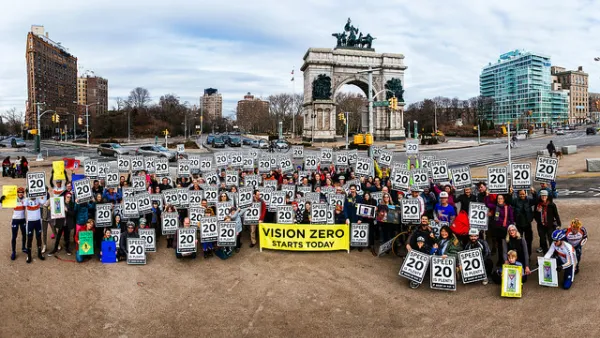Car-oriented politics keeps scoring wins in Phoenix.

"The Phoenix City Council for the first time ever discussed setting a goal to reduce pedestrian deaths — weeks after an Arizona Republic report that detailed the deadliest crossings — but then voted to kill the plan," according to an article by Agnel Phillip and Jessica Boehm.
The status of Vision Zero in Phoenix was still remarkably preliminary, given how many cities across the country have already adopted a policy, in name at least, to eliminate traffic fatalities. "Tuesday's vote would have directed city staff to assemble a framework of recommendations for reaching the goal of eliminating pedestrian deaths," according to Phillip and Boehm.
"Instead of seeking that research, several city council members said they were concerned that moving toward Vision Zero would force the city to adopt a strict protocol on all city streets that would lower speeds and, in turn, increase vehicle traffic congestion."
Phoenix has the highest fatality rate of any city in the state of Arizona over a population of 10,000. The City Council also recently voted to eliminate voter approved funding for a light rail extension planned for West Phoenix, and voters will get a chance to eliminate six planned light rail routes in an upcoming election. While public transit has been suffering in the local political scene, planners have been working to allow new density and building heights to the city's downtown core, so Phoenix will continue to be a location to watch the a confrontation between the shifting dynamics of planning best practices and the realities of urban politics in newer cities in the western United States.
FULL STORY: Phoenix officials vote against developing plan to eliminate roadway deaths

Planetizen Federal Action Tracker
A weekly monitor of how Trump’s orders and actions are impacting planners and planning in America.

Chicago’s Ghost Rails
Just beneath the surface of the modern city lie the remnants of its expansive early 20th-century streetcar system.

Amtrak Cutting Jobs, Funding to High-Speed Rail
The agency plans to cut 10 percent of its workforce and has confirmed it will not fund new high-speed rail projects.

Ohio Forces Data Centers to Prepay for Power
Utilities are calling on states to hold data center operators responsible for new energy demands to prevent leaving consumers on the hook for their bills.

MARTA CEO Steps Down Amid Citizenship Concerns
MARTA’s board announced Thursday that its chief, who is from Canada, is resigning due to questions about his immigration status.

Silicon Valley ‘Bike Superhighway’ Awarded $14M State Grant
A Caltrans grant brings the 10-mile Central Bikeway project connecting Santa Clara and East San Jose closer to fruition.
Urban Design for Planners 1: Software Tools
This six-course series explores essential urban design concepts using open source software and equips planners with the tools they need to participate fully in the urban design process.
Planning for Universal Design
Learn the tools for implementing Universal Design in planning regulations.
Caltrans
City of Fort Worth
Mpact (founded as Rail~Volution)
City of Camden Redevelopment Agency
City of Astoria
City of Portland
City of Laramie





























